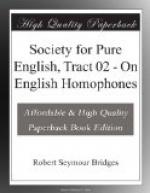We have the best Bible in the world, and in Shakespeare the greatest poet; we have been suckled on those twin breasts, and our children must have degenerated if they need asses’ milk. Nor is it only because the old is better than the new that we think thus. If we speak more proudly of Trafalgar than of Zeebrugge, it is not because Trafalgar is so far finer a sounding word than Zeebrugge, as indeed it is, nor because we believe that the men of Nelson’s time were better than our men of to-day, we know they were not, but because the spirit that lives on ideals will honour its parents; and it is thinking in this way that makes noble action instinctive and easy. Nelson was present at Zeebrugge leading our sailors, as Shakespeare is with us leading our writers, and no one who neglects the rich inheritance to which Englishmen are born is likely ever to do any credit to himself or his country.
5. THAT THE SOUTH ENGLISH DIALECT IS A DIRECT AND CHIEF CAUSE OF HOMOPHONES.
[Sidenote: Evidence of Jones’ dictionary.]
Evidence of the present condition of our ruling educated speech in the South of England I shall take from Mr. Daniel Jones’ dictionary,[16] the authority of which cannot, I think, be disputed. It is true that it represents a pronunciation so bad that its slovenliness is likely to be thought overdone, but there is no more exaggeration than any economical system of phonetic spelling is bound to show. It is indeed a strong and proper objection to all such simplifications that they are unable to exhibit the finer distinctions; but this must not imply that Mr. Jones’ ear is lacking in delicate perception, or that he is an incompetent observer. If he says, as he does say, that the second syllable in the words obloquy and parasite are spoken by educated Londoners with the same vowel-sound (which he denotes by [e], that is the sound of er in the word danger), then it is true that they are so pronounced, or at least so similarly that a trained ear refuses to distinguish them [obl_er_quy, par_er_site].




